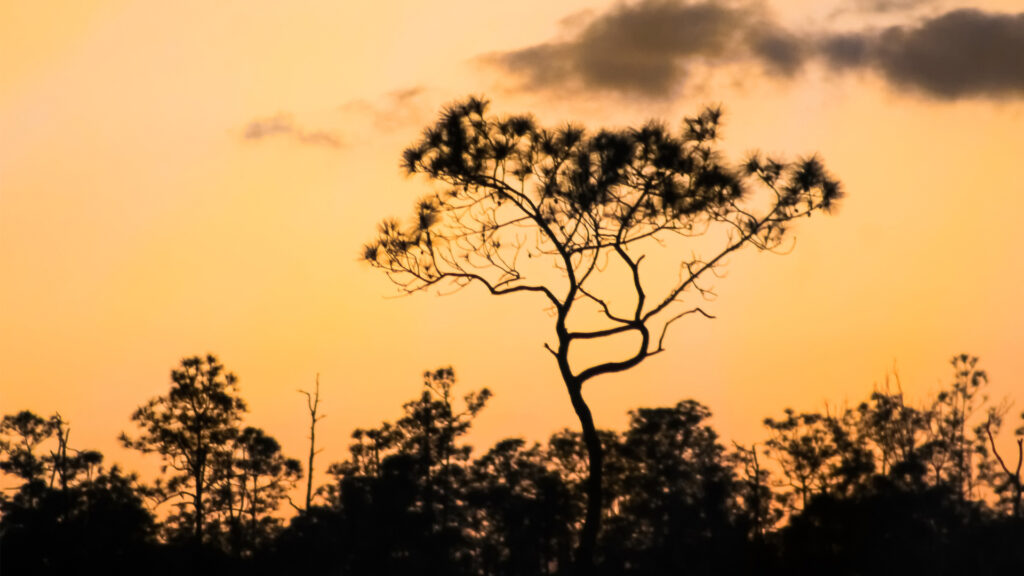By José Francisco Barros and Lauren Jonaitis, Tropical Audubon Society
Among the many things that make Miami special, few are as awe-inspiring and enchanting as the remaining stands of globally critically imperiled pine rocklands that exist nowhere in the world other than in Florida and the Bahamas.
From the rocky limestone floor — adorned with small colorful herbs and flowers — to the towering Dade County pines, whose needled branches filter the dappled sunlight required for the understory to thrive, the pine rockland forests are essential to sustaining an astonishing diversity of plants and animals, many of which are federally endangered or threatened.
Yet, this precious ecosystem could vanish forever if we don’t protect them.
To lose Miami’s pine rocklands would mean losing one of the most exceptional pieces of Florida’s natural heritage. These once-common forests now only exist as fragments in the Everglades, Florida Keys and scattered along Miami-Dade’s Miami Rock Ridge.
Climate change-driven sea level rise threatens to wipe out the pine rocklands in the Florida Everglades and Keys. In Miami-Dade, the higher-elevation pine rocklands are more resilient to rising seas because the oolitic limestone ridge is a figurative life raft for these rare forests. But urban development is relentless, threatening to raze what little is left of this unique habitat.

Only 10% of pine rocklands remain globally, with less than 2% existing in Miami-Dade outside Everglades National Park. Despite that frighteningly low number, the remaining forests continue to support an astonishing amount of biodiversity.
There are 23 federally protected imperiled species that call pine rocklands home, including the tiny, iridescent green Miami tiger beetle, which is found nowhere else on Earth, and the Florida bonneted bat is the only bat found exclusively in Florida.
Species ranging from Bartrams’ scrub-hairstreak butterflies to rare and imperiled plants, such as the Florida Brickell-bush, also thrive in these surviving forests. And biologists continue to discover new organisms, such as the pine rockland trap door spider, demonstrating that there’s more to lose than we even know.
Protecting our pine rocklands doesn’t just help wildlife; it’s good for humans, too. The forest provides a peaceful oasis where we can seek beauty and renewal in nature, wander through towering slash pines and observe the determined little herbs and flowers sprouting from exposed limestone, where children can experience Florida’s natural beauty firsthand and maybe even glimpse an endangered plant or animal.
It’s no wonder so many of us are dedicated to protecting these rare green gems in urban Miami-Dade. Whether planting rare ferns, surveying for gopher tortoises or rallying in support of stronger environmental protections — each act of service is borne out of a deep love and appreciation for these cherished places.
The conservation community breathed a big, deep, collective sigh of relief recently when the Miami-Dade commission rejected the proposed $100 million Miami Wilds water theme park adjacent to the Richmond pine rocklands in south Miami-Dade because it would’ve decimated yet another of the rare remnant parcels we so desperately need to preserve. The project had originally been approved by voters in 2006 and had been scaled down through the years over environmental concerns which grew more intense.
It was a hard-won conservation victory. We must, therefore, re-commit ourselves to holding our elected officials accountable for protecting, preserving and restoring the Miami-Dade pine rocklands for future generations.
This includes preserving and managing what’s left of these rare forests through a conservation designation, and also restoring degraded pine rocklands to their former natural glory.
Well-crafted protections for Miami-Dade’s vital pine rocklands will help keep South Florida ecologically vibrant and beautiful.
Let’s do right by our endangered wildlife — and ourselves — by safeguarding the fragile and ecologically crucial pine rocklands that remain.
José Francisco Barros is the president of Tropical Audubon Society and Lauren Jonaitis is its senior conservation director. This opinion piece was originally published by the Miami Herald, which is a media partner of The Invading Sea.
If you are interested in submitting an opinion piece to The Invading Sea, email Editor Nathan Crabbe at ncrabbe@fau.edu. Sign up for The Invading Sea newsletter by visiting here.



